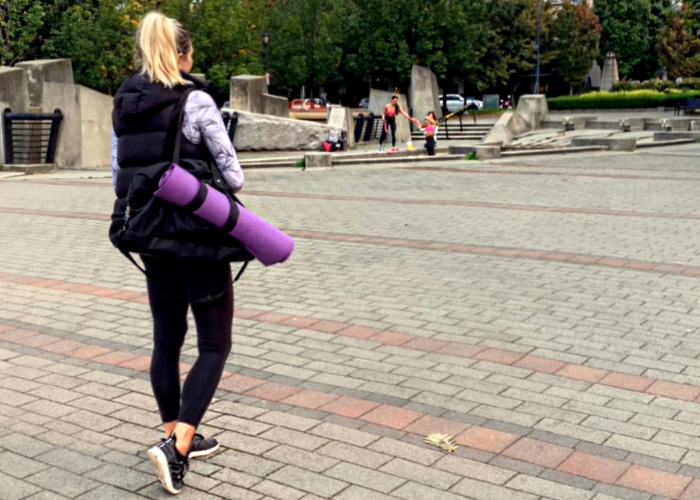Bubbly. Outgoing. Fearless. Energetic.
According to decades of feedback from friends, colleagues, family, teachers and random passersby, that’s who I am. Sure, I’ve been described differently along the way, but those words are the ol’ go-tos. If the same adjectives continuously rise to the surface, for as long as you can remember… well, that must be who you are. Right? What happens if – in what feels like overnight – you feel the opposite?
That’s what happened to me a few years ago.
It wasn’t exactly overnight, but I was steadily feeling very unlike myself: Listless. Introverted. Paranoid. Unmotivated.
I fell into a dark hole. Not a sadness I could attribute to something happening, like a break-up or loss. Just a constant state I can only describe as fear with a side of shame. The type of fear that induces a chemical (usually very irrational) fight-or-flight reaction in daily life. And, shame that people know you’re not being yourself, but paranoid, introverted, or worse – crazy.
Feeling like I was losing myself was an awful feeling, but I could stomach it internally. When the people who love me started to notice something was wrong it felt like I’d been punched in the gut. I wanted to protect them, so I’d isolate myself. When my mom would call at 11am and I was still sleeping – something very out of character for me – I’d call her back around 1pm saying that I’d been at yoga, running errands or another excuse that was more Stef-like. When isolation wasn’t an option, I’d show up and do my best impersonation of my former-self, often completely over-compensating. I’d go to bed at the end of the night exhausted, ashamed, and scared to death about where the “real me” was and if she’d ever come back.
Some days were better than others. As I explained to my best friend once as she tried hard to understand, it felt like I was living on a stormy beach. Most of the days, during that time, the sky was grey and gloomy. On the good days, the clouds would roll out and the sun would shine. But, those sunny days were never carefree like they used to be, I always knew the inevitable storm would wash over me like it always did. It was a matter of time. Would it be tomorrow? Would it be tonight at dinner with my boyfriend’s colleagues? Would it be when I’m playing with my goddaughter at the park? Or when I was alone and couldn’t get a hold of anyone?
That fear was suffocating.
The problem I had with my mental illness is that I thought it was BS. I’d been through worse – much worse. People everywhere go through much worse. Who was I to feel so sorry for myself? To be so trapped in my own head that I was piloting an outer-persona, to mask the battle with feelings, fear and an abusive self-narrative going on inside of myself?
Why couldn’t I just get my shit together?
Surely, if I just pushed through pretending to by myself I’d eventually come back. Right? Very wrong…
I hit rock bottom. I could no longer hide my sadness, or protect my family or friends from worrying about me.
I had to get help.
Taking the step to get help is scary. Like, really scary. The facade I’d worked so hard to maintain was blown, and I felt like a nutcase.
But to my relief, no men in white coats rushed in to put me in a straitjacket. Yes, I was nervous for that first hurdle of reaching out, but once I had I felt an immediate weight lift off of me. Through appointments with my GP and specialists, I felt understood, normal, and definitely not alone. It wasn’t dramatic or stressful like I’d imagined. Nor did the doctors sit back and examine me from a distance like I was a few bricks short of a load. (I really feared this, which now I find laughable.)
The tough part about a mental illness is the diagnosis. It’s not like most physical ailments where you can draw blood and peek under a microscope, or take an X-ray and simply point to the dark spot. It takes a few months of testing, and a lot of patience. The symptoms of most mental illnesses are emotions or feelings that everyone feels: depression, for example. Everyone gets depressed, it’s a part of the grief process and completely natural. But, there’s a difference between a human emotion and clinical depression. Sure, we all get distracted, but it doesn’t affect everyone’s daily life as it does to someone with ADHD. And likewise, we all get stressed and anxious, but there’s a difference when someone can’t cope with social, work or family obligations because of fear.
Treatment is different for everyone. And on top of a medical regime, it’s important to commit to your well-being. The same way someone with asthma shouldn’t run around in a dusty, old barn, I had to realize my triggers. For me, it means working out regularly, sleeping at a decent time, being cognizant of my alcohol intake, and surrounding myself with people who care about me. And like an asthmatic can find relief by stepping into fresh air or taking a puff from an inhaler, I can usually calm my anxiety with a bubble bath or a minute alone focusing on my breathing.
You can get your life back.
I’m writing this because there’s nothing to be ashamed of – but I know that’s not how it feels.
I’m writing this because I’m not alone – feeling some sort of way doesn’t make you weak or crazy. One in five Canadians has a mental illness. We’re in this together.
I’m writing this because I was lucky enough to have family and friends that worked to understand, and support me – and not everyone has that.
I’m writing this because I am bubbly, outgoing, fearless, and energetic – and this was the hardest thing I’ve ever written. I understand if it’s hard for someone reading this to get help. But please do. I promise reaching out is the hardest part.
Speak to someone.
It’s daunting – but you can’t put a price on getting yourself back.




